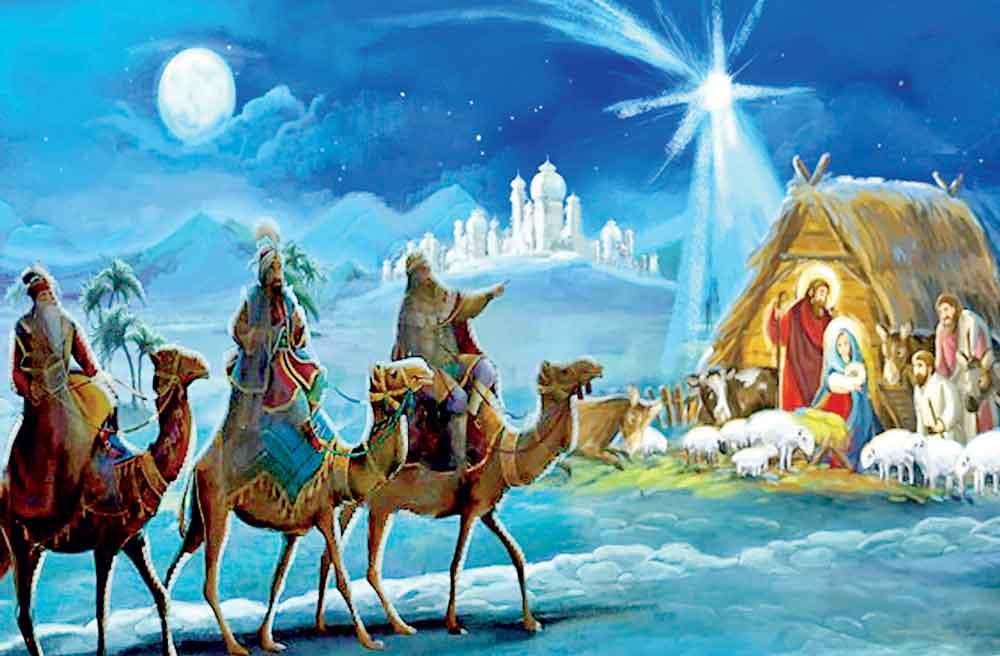Reply To:
Name - Reply Comment

We can celebrate Christmas not as a fleeting moment of festivity, but as an ongoing journey towards spiritual renewal and growth
| The journey of the Magi to Bethlehem reminds us that true celebration requires effort, reflection, and sometimes even severe hardships |
| Are we clinging to traditions or habits that distract us from the transformative power of Christ’s Birth? |
(A Spiritual Reflection on T. S. Eliot’s Poem ‘The Journey of the Magi’ to Live the Spirit of Christmas Meaningfully)
 The modernist poet T.S. Eliot’s ‘The Journey of the Magi’ is a profound dramatic monologue that intertwines the Biblical narrative of the Magi’s journey to witness the Birth of Christ with a deeper exploration of spiritual transformation. Written in the year 1927, shortly after Eliot’s conversion to Anglicanism, the poem captures the tension between the old and the new, the physical and the spiritual, and the challenges inherent in a journey towards one’s spiritual struggles and transformation. In reflecting on the Magi’s experience, the poet not only retells a familiar story but also invites readers to contemplate their own spiritual journey and the meaning of Christmas in today’s world.
The modernist poet T.S. Eliot’s ‘The Journey of the Magi’ is a profound dramatic monologue that intertwines the Biblical narrative of the Magi’s journey to witness the Birth of Christ with a deeper exploration of spiritual transformation. Written in the year 1927, shortly after Eliot’s conversion to Anglicanism, the poem captures the tension between the old and the new, the physical and the spiritual, and the challenges inherent in a journey towards one’s spiritual struggles and transformation. In reflecting on the Magi’s experience, the poet not only retells a familiar story but also invites readers to contemplate their own spiritual journey and the meaning of Christmas in today’s world.
The Journey as a Metaphor for Spiritual Transformation
The poem begins with a vivid description of the arduous journey undertaken by the Magi, emphasizing the difficulty and discomfort of their travel:
“A cold coming we had of it,
Just the worst time of the year
For a journey, and such a long journey.”
This blunt opening conveys the physical hardships of the Magi’s quest, but it also symbolizes the inner struggle of spiritual existence. The cold and hostile conditions mirror the internal resistance and doubt that often accompany spiritual transformation. The Magi’s perseverance, despite the obstacles, reflects the necessity of enduring hardships to reach spiritual fulfillment in one’s life.
In our contemporary celebration of Christmas, this notion challenges the tendency to focus solely on material comforts and festive indulgence. The journey of the Magi to Bethlehem reminds us that true celebration requires effort, reflection, and sometimes even severe hardships, as we seek to align our lives with deeper spiritual truths.
The Tension between the Old and the New
Eliot’s Magi are not only physical travellers but also representatives of a worldview in transition. The narrator reflects on the cultural and spiritual dissonance they encounter:
“There were times we regretted
The summer palaces on slopes, the terraces,
And the silken girls bringing sherbet.”
This longing for past luxuries underscores the Magi’s awareness that the old ways of life are slipping away. Their journey signifies the birth of a new spiritual order, heralded by Jesus’ arrival, which disrupts their familiar world. This sense of disorientation is a universal aspect of spiritual awakening: the old self must die for the new self to emerge and thrive.
In the context of modern Christmas, this theme invites us to consider what aspects of our lives may need to be relinquished to embrace the true meaning of the season. Are we clinging to traditions or habits that distract us from the transformative power of Christ’s Birth? Eliot’s Magi challenge us to let go of what is comfortable but spiritually unfulfilling and unenduring.
The Epiphany and Its Ambiguities
The climactic moment of the Magi’s journey – their encounter with the Newborn Baby – is described obliquely in the poetic meditation. Rather than detailing the event, Eliot focuses more on its profound spiritual implications:
“...were we led all that way for
Birth or Death? There was a Birth, certainly,
We had evidence and no doubt. I had seen birth and death,
But had thought they were different; this Birth was
Hard and bitter agony for us, like Death, our death.”
This paradoxical reflection reveals the dual nature of Christ’s Birth: it is both a joyous beginning and a harbinger of sacrifice and death. For the Magi, the encounter transforms their understanding of life and death, signalling the death of their old selves and the birth of a new way of living.
Eliot’s ambiguity here speaks to the complexity of spiritual transformation. The true celebration of Christmas is not limited to sentimental joy of the season; it encompasses the recognition of Jesus’ Mission here on earth, which includes suffering and redemption – both the ‘Cross’ and the ‘Crown’. For modern believers, this perspective encourages a deeper engagement with the season, moving beyond superficial festivities to embrace the transformative power of Christmas.
Returning Totally Changed: The Challenge of Living a New Life
The poem concludes with the Magi’s return to their homeland, where they find themselves alienated from their former lives:
“We returned to our places, these Kingdoms,
But no longer at ease here, in the old dispensation,
With an alien people clutching their gods.”
This sense of estrangement highlights the cost of spiritual awakening. The Magi’s encounter with Christ has irrevocably changed them, rendering their old world and its values unrecognizable. Similarly, the true celebration of Christmas calls for a transformation that impacts our daily lives. It challenges us to live in a way that reflects the radical love and humility of Christ, even when it sets us apart from the values of the surrounding culture.
Lessons for a Meaningful Christmas Celebration
Eliot’s ‘The Journey of the Magi’ provides rich insights for celebrating Christmas in a spiritually meaningful and profitable way. In a world often dominated by consumerism and superficial cheer, the poem invites us to embark on our own spiritual journey, embracing the challenges and transformation that spring up with our meaningful living.
Reclaiming the Journey
Like the Magi, we too are called to embark on a journey towards spirituality, even when it is inconvenient or uncomfortable. This might involve setting aside time for religious practices, silent reflection, or acts of service during this busy holiday season. It requires an intentional effort to seek the spiritual path amid the distractions of the modern world.
Letting Go of the Old
The Magi’s journey signifies the necessity of leaving behind old ways to embrace new spiritual truths. This Christmas, we might reflect on what habits, attitudes, or attachments we need to release to experience the transformative power of Christ’s Birth to the fullest.
Embracing the Paradox of Joy in Sacrifice
Eliot’s depiction of Christ’s Birth as both joyous and agonizing reminds us that Christmas is inseparable from the Cross. Celebrating Christmas meaningfully involves recognizing the sacrificial love of Christ and committing to embody that love in our interactions with others.
Living Transformed Lives
Just as the Magi returned home radically transformed, we too are called to let the Message of Christmas shape our lives throughout the coming year. This might involve a renewed commitment to justice, generosity, and compassion, reflecting the values of a Spiritual Kingdom.
The Journey Continues…!
T.S. Eliot’s ‘The Journey of the Magi’ thus offers a profound meditation on the spiritual significance of Christmas, emphasizing the transformative power of encountering Christ. It challenges us to see beyond the surface of the holiday to its deeper meaning, urging us to embark on our own day-to-day journey of spiritual transformation.
Eliot’s ambiguity here speaks to the complexity of spiritual transformation. The true celebration of Christmas is not limited to sentimental joy of the season; it encompasses the recognition of Jesus’ Mission here on earth, which includes suffering and redemption – both the ‘Cross’ and the ‘Crown’
As we celebrate Christmas 2024, let us be inspired from the Magi’s perseverance, openness, and courage! Let their journey remind us that the true meaning of Christmas lies not in comfort or tradition but in the radical, life-changing encounter with the Divine. By embracing this perspective with conviction, we can celebrate Christmas not as a fleeting moment of festivity, but as an ongoing journey towards spiritual renewal and growth. If we keep Jesus’ Teachings in our hearts, Christmas has no end…!